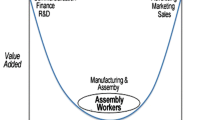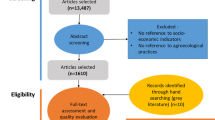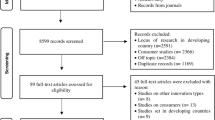Abstract
Corporate social responsibility (CSR) has long been an issue for research and practice. More recently, in response to growing public scrutiny, it has also gained importance in the agribusiness sector. Research has highlighted a growing gap between public perceptions of farming and food production processes and the realities of modern agriculture and the food industry. This can threaten the reputation and legitimacy of companies operating in this sector. One proactive means for companies to meet societal expectations is to make an active commitment to society and its needs by implementing a CSR policy. However, there is still no clear definition of CSR, and what important stakeholders actually expect from companies remains largely unknown. This paper focuses on consumers’ perception of CSR. Its objective is to explore a CSR policy design for German agribusiness based on Archie B. Carroll’s famous pyramid model. A consumer survey was conducted to evaluate the CSR demands society places on agribusiness companies. An explorative factor analysis was employed to discover the outline of the construct in the German agribusiness context. The results reveal that Carroll’s model, which was developed from a U.S. point of view, cannot be confirmed for German agribusiness. Instead of Carroll’s four responsibility groups, three areas of responsibility were identified: economic, internal and external. These results have manifold implications for CSR strategies in agribusiness firms and represent an important origin for future investigations on CSR in other countries as well as in specific agribusiness subsectors.

Source Authors’ calculation
Similar content being viewed by others
Notes
Scale: „−2 = very unimportant“ to „+2 = very important“.
References
Albersmeier, F., & Spiller, A. (2008). Supply chain reputation in der Fleischwirtschaft. Discussion paper 0811, Department of Agricultural Economics and Rural Development, University of Goettingen.
Aupperle, K. E., Carroll, A. B., & Hatfield, J. D. (1985). An empirical investigation of the relationship between corporate social responsibility and profitability. Academy of Management Journal, 28(2), 446–463.
Backhaus, K., Erichson, B., Plinke, W., & Weiber, R. (2016). Multivariate Analysemethoden: Eine anwendungsorientierte Einführung (14th ed.). Berlin: Springer.
Backhaus-Maul, H., & Braun, S. (2007). Gesellschaftliches Engagement von Unternehmen in Deutschland. Konzeptionelle Überlegung und empirische Befunde. Rote Seiten—Stiftung und Sponsoring, 10(5), 1–15.
Berk, J. (2012). Technik in der Geflügelhaltung. In L. Frerichs (Eds.), Jahrbuch Agrartechnik 2012 (pp. 1–9). https://publikationsserver.tu-braunschweig.de/receive/dbbs_mods_00043468. Accessed 22 Apr 2013.
Böhm, J., Albersmeier, F., Spiller, A., & Zühlsdorf, A. (2009). Zukunftsfaktor gesellschaftliche Akzeptanz: Kommunikation mit der Öffentlichkeit—mehr als Krisen-PR. In J. Böhm, F. Albersmeier, & A. Spiller (Eds.), Die Ernährungswirtschaft im Scheinwerferlicht der Öffentlichkeit (pp. 5–16). Lohmar, Köln: Eul.
Bowen, H. R. (1953). Social responsibilities of the businessman. New York: Harper&Row.
Brosius, F. (2011). SPSS 19. Hallbergmoos: Pearson Deutschland GmbH.
Butaney, G., & Wortzel, L. H. (1988). Distributor power versus manufacturer power: The customer role. The Journal of Marketing, 52(1), 52–63.
Cai, Z., & Aguilar, F. X. (2014). Corporate social responsibility in the wood products industry: US and Chinese consumers’ perceptions. Forest Products Journal, 64(3), 97–106.
Carroll, A. B. (1979). A three-dimensional conceptual model of corporate performance. Academy of Management Review, 4(4), 497–505.
Carroll, A. B. (1991). The pyramid of corporate social responsibility: Toward the moral management of organizational stakeholders. Business Horizons, 34(4), 39–48.
Carroll, A. B. (1999). Corporate social responsibility: Evolution of a definitional construct. Business and Society, 38(3), 268–295.
Crane, A., Matten, D., & Spence, L. J. (2013). Corporate social responsibility in a global context. In A. Crane, D. Matten, & L. J. Spence (Eds.), Corporate social responsibility: Readings and cases in a global context (pp. 3–26). Abingdon: Routledge.
Dahlsrud, A. (2008). How corporate social responsibility is defined: An analysis of 37 definitions. Corporate Social Responsibility and Environmental Management, 15(1), 1–13.
Davis, K. (1960). Can business afford to ignore social responsibilities? California Management Review, 2(3), 70–76.
De Quevedo-Puente, E., De la Fuente-Sabaté, J. M., & Delgado-García, J. B. (2007). Corporate performance and corporate reputation: Two interwoven perspectives. Corporate Reputation Review, 10(1), 60–72.
Eisenegger, M., & Imhof, K. (2009). Funktionale, soziale und expressive Reputation—Grundzüge einer Reputationstheorie. In U. Röttger (Ed.), Theorien der Public Relations. Grundlagen und Perspektiven der PR-Forschung (pp. 243–264). Wiesbaden: VS Verlag für Sozialwissenschaften.
Federal Statistical Office. (2016). Statistisches Jahrbuch 2016. Accessed Feb 15, 2017, from https://www.destatis.de/DE/Publikationen/StatistischesJahrbuch/StatistischesJahrbuch2016.pdf?__blob=publicationFile.
Freeman, R. E. (1984). Strategic management: A stakeholder approach. Cambridge: Cambridge University Press.
Gössling, T. (2011). Corporate social responsibility and business performance. Theories and evidence about organizational responsibility. Cheltenham: Edward Elgar Publishing.
Hartmann, M. (2011). Corporate social responsibility in the food sector. European Review of Agricultural Economics, 38(3), 297–324.
Heyder, M. (2010). Strategien und Unternehmensperformance im Agribusiness. Göttingen: Cuvillier.
Heyder, M., & Theuvsen, L. (2009). Corporate social responsibility im agribusiness. In J. Böhm, F. Albersmeier, & A. Spiller (Eds.), Die Ernährungswirtschaft im Scheinwerferlicht der Öffentlichkeit (pp. 47–73). Lohmar, Köln: Eul Verlag.
Heyder, M., & Theuvsen, L. (2012). Determinants and effects of corporate social responsibility in German agribusiness: A PLS model. Agribusiness, 28(4), 400–428.
Hierholzer, V. (2010). Nahrung nach Norm: Regulierung von Nahrungsmittelqualität in der Industrialisierung 1871–1914—Kritische Studien zur Geschichtswissenschaft. Göttingen: Vandenhoeck & Ruprecht.
Hiß, S. (2006). Warum übernehmen Unternehmen gesellschaftliche Verantwortung: Ein soziologischer Erklärungsversuch. Frankfurt a. Main, NY: Campus.
Hwang, J., & Kandampully, J. (2015). Embracing CSR in pro-social relationship marketing program: Understanding driving forces of positive consumer responses. Journal of Services Marketing, 29(5), 344–353.
Luhmann, H., & Theuvsen, L. (2016). Corporate social responsibility in agribusiness: Literature review and future research directions. Journal of Agricultural and Environmental Ethics, 29(4), 673–696.
Maignan, I. (2001). Consumers’ perceptions of corporate social responsibility: A cross-country analysis. Journal of Business Ethics, 30(1), 57–72.
Maloni, M. J., & Brown, M. E. (2006). Corporate social responsibility in the supply chain: An application in the food industry. Journal of Business Ethics, 68(1), 35–52.
Matten, D., & Moon, J. (2008). “Implicit” and “explicit” CSR: A conceptual framework for a comparative understanding of corporate social responsibility. Acadademic Management Review, 33(2), 404–424.
Mayerhofer, W., Grusch, L., & Mertzbach, M. (2008). Corporate Social Responsibility—Einfluss auf die Einstellung zu Unternehmen und Marken. Wien: Facultas.
McGuire, J. W. (1963). Business and society. New York: McGraw-Hill.
Mohr, L. A., Webb, D. J., & Harris, K. E. (2001). Do consumers expect companies to be socially responsible? The impact of corporate social responsibility on buying behaviour. Journal of Consumer Affairs, 35(1), 45–72.
Münstermann, M. (2007). Corporate Social Responsibility—Ausgestaltung und Steuerung von CSR-Aktivitäten. Wiesbaden: Gabler Verlag.
Nahapiet, J., & Ghoshal, S. (1998). Social capital, intellectual capital, and the organizational advantage. Academy of Management Review, 23(2), 242–266.
Papadopoulos, N., Heslop, L. A., & Bamossy, G. (1990). A comparative image analysis of domestic versus imported products. International Journal of Research in Marketing, 7(4), 283–294.
Ramasamy, B., & Yeung, M. (2009). Chinese consumers’ perception of corporate social responsibility (CSR). Journal of Business Ethics, 88(1), 119–132.
Ranängen, H., & Zobel, T. (2014). Revisiting the ‘how’ of corporate social responsibility in extractive industries and forestry. Journal of Cleaner Production, 84(1), 299–312.
Raupp, J., Jarolimek, S., & Schultz, F. (2011). Corporate Social Responsibility als Gegenstand der Kommunikationsforschung—Einleitende Anmerkungen, Definitionen und disziplinäre Perspektiven. In J. Raupp, S. Jarolimek, & F. Schultz (Eds.), Handbuch CSR (pp. 9–18). Wiesbaden: VS Verlag für Sozialwissenschaften.
Rommelspacher, M. (2012). Corporate Social Responsibility aus Konsumentensicht. Wiesbaden: Gabler Verlag.
Röttger, U., & Schmitt, J. (2009). Bedingungen, Chancen und Risiken der Reputationskonstitution ökonomischer Organisationen durch Corporate Responsibility. In S. J. Schmidt & J. Tropp (Eds.), Die Moral der Unternehmenskommunikation. Lohnt es sich, gut zu sein? (pp. 39–58). Köln: Herbert von Halem Verlag.
Savage, G. T., Nix, T. W., Whitehead, C. J., & Blair, J. D. (1991). Strategies for assessing and managing organizational stakeholders. Academy of Management Perspectives, 5(2), 61–75.
Schoenheit, I. (2006). Corporate Social Responsibility—Deutsche und internationale Perspektiven am Beispiel China. In I. Schoenheit, W. Iwand, & R. Kopp (Eds.), Corporate Social Responsibility—Verantwortung für nachhaltiges Wirtschaften in China (pp. 9–24). Berlin: Beuth.
Sen, S., & Bhattacharya, C. B. (2001). Does doing good always lead to doing better? Consumer reactions to corporate social responsibility. Journal of Marketing Research, 38(2), 225–243.
Sheehy, B. (2014). Defining CSR: Problems and solutions. Journal of Business Ethics, 131(3), 625–648.
Singh, J., Sanchez, M., & Bosque, I. (2008). Understanding corporate social responsibility and product perceptions in consumer markets: A cross-cultural evaluation. Journal of Business Ethics, 80(3), 597–611.
Spiller, A., Schulze, B., & Cordts, A. (2010). Was essen wir in zwanzig Jahren? DLG-Mitteilungen, 1, 20–23.
Thießen, A. (2011). Organisationskommunikation in Krisen. Reputationsmanagement durch situative, integrierte und strategische Krisenkommunikation. Wiesbaden: VS Verlag für Sozialwissenschaften.
Tian, Z., Wang, R., & Yang, W. (2011). Consumer responses to corporate social responsibility (CSR) in China. Journal of Business Ethics, 101(2), 197–212.
Funding
This publication was funded as part of the project Corporate Social Responsibility in Agribusiness by the Federal Ministry for Nutrition and Agriculture and the Federal Institute for Agriculture and Nutrition (Grant Number 2812HS018).
Author information
Authors and Affiliations
Corresponding author
Ethics declarations
Conflict of interest
The authors declare that they have no conflict of interest.
Rights and permissions
About this article
Cite this article
Luhmann, H., Theuvsen, L. Corporate Social Responsibility: Exploring a Framework for the Agribusiness Sector. J Agric Environ Ethics 30, 241–253 (2017). https://doi.org/10.1007/s10806-017-9665-8
Accepted:
Published:
Issue Date:
DOI: https://doi.org/10.1007/s10806-017-9665-8




